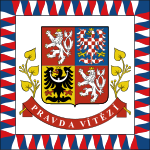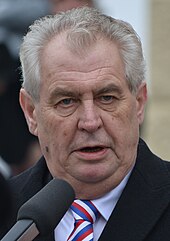President (Czech Republic)
| President of the Czech Republic | |

|
|
|
Standard of the president with the traditional motto, which goes back to Tomáš Garrigue Masaryk , “ The truth wins! " |
|

|
|
|
Acting President Miloš Zeman since March 8, 2013 |
|
| Official seat | Castle of Prague |
| Term of office | 5 years (re-election possible once) |
| Last choice | Jan. 27, 2018 |
| website | www.hrad.cz |
The Czech President (officially Czech Prezident republiky 'President of the Republic') is the head of state of the Czech Republic . He was elected by the House of Representatives and the Senate in a joint session before 2013 . Since then, the office holder has been determined by direct election. The electoral term is 5 years, re-election is possible once. The minimum age for election to the President is 40 years, corresponding to the minimum age for membership in the Senate. He can only be charged with high treason before the Constitutional Court and is otherwise not responsible to any other constitutional body for his administration.
Suffrage
Right to vote until 2012
According to Art. 56 of the Czech Constitution, new elections are to be held within 30 days in the 30 days before the end of the term of office or if the office is permanently discharged, for example through death or resignation. The minimum age for admission to the Senate election also applies to the election of the President and a person cannot be elected more than twice (Art. 57). At least ten MPs or ten senators can propose a candidate for election. The election is won by whoever can unite over half of both houses, i.e. both the absolute majority of the votes of the senators and of the deputies. If none of the candidates succeeds, a second ballot must be held within 14 days. This is faced by the candidate who has received the highest number of votes from the Senators in the first ballot and the candidate who has received the most votes from the MPs. If there is a tie in the votes of senators or members of parliament, the person who has received the most votes in total from the representatives of both chambers will enter the second ballot; in turn, the second ballot will be won by whoever has an absolute majority of votes from both chambers. If neither of the two candidates succeeds in this, a third ballot must be held within 14 days. If none of the applicants can achieve the necessary approval, a completely new election must be held (Art. 58).
New voting rights from 2013
On December 14, 2011, the House of Representatives introduced direct election of the president, on February 8, 2012 the Senate approved. Thus, the next president was elected directly in 2013, see presidential election in the Czech Republic 2013 .
Oath of office
The newly elected President takes the following oath of office during a joint session of both chambers, chaired by the President of the House of Representatives:
“I swear allegiance to the Czech Republic. I swear to uphold their constitution and laws. I swear on my honor that I will fulfill my office in the interest of the whole people and to the best of my knowledge and belief. "
In the Czech original:
“Slibuji věrnost České republice. Slibuji, že budu zachovávat její Ústavu a zákony. Slibuji na svou čest, že svůj úřad budu zastávat v zájmu všeho lidu a podle svého nejlepšího vědomí a svědomí. "
If the elected person refuses to take the oath or takes it with a reservation, he should be regarded as not elected (Art. 60). The President assumes his office on the day of taking his oath of office (Art. 55).
Competencies
Independent skills
According to Article 62 of the Czech Constitution, the President appoints and dismisses the Prime Minister and the other members of the government, accepts their resignation and dismisses the entire government or accepts its resignation. It can entrust a dismissed or resigned government with the continuation of official business until a new government has been appointed. Furthermore, it convenes the House of Representatives for meetings or dissolves it under certain conditions. He appoints the judges of the Constitutional Court, its presidents and the vice-presidents. He also has the right to pardon , the right to mitigate punishment and the right to abolition . It notarizes laws passed by parliament, but can also re-submit a law that has already been passed, with the exception of constitutional laws. He also appoints the President and Vice-President of the Supreme Control Office and the members of the Bank Council of the Czech National Bank .
Competencies with commitment
Subject to the consent of the Prime Minister or a minister authorized by the Prime Minister, the President represents the state vis-à-vis other countries, negotiates and signs international treaties - he can also delegate this authority - is Commander-in-Chief of the Armed Forces , accepts the accreditations of foreign representatives, appoints and dismisses the heads of the Czech diplomatic missions, organizes elections for the House of Representatives and the Senate, can appoint and promote generals, awards medals - this competence can also be delegated - appoints judges and exercises the right to grant amnesties (Art. 63) . The government is responsible for these decisions.
Further powers
In addition to the provisions of Articles 62 and 63, further powers can be assigned to the President by law. He also has the right to attend the meetings of the two chambers of parliament or their committees and commissions and to speak there. He is also entitled to be present at government meetings and to request reports from them (Art. 64).
stand-in
If the president has died, a new head of state has not yet been sworn in, or if both chambers of parliament have declared the president to be incapable of office, his powers under Art. 63 para. 1 a), b), c), d), e), h), i) and j), and of Art. 63 Para. 2 to the Prime Minister, those of Art. 62 a), b), c), d), e) and k) to the President of the Chamber of Deputies or if the House of Representatives is dissolved at that time, it will pass to the President of the Senate.
responsibility
Only the Senate can bring charges before the Constitutional Court against the President and only because of the crime of high treason. In the case of a guilty verdict, the judgment can only be for loss of office and loss of the opportunity to regain office. The President cannot be held criminally or politically responsible for his other duties. Crimes committed in office cannot be prosecuted (Art. 65). The incumbent thus has partial political immunity .
Term expires
The term of office ends when the term of office expires, when a declaration of resignation has been deposited with the President of the House of Representatives (Art. 61), by a conviction by the Constitutional Court or by death.
Official
Since the establishment of the Czech Republic in 1993, three people have held the office of Czech President. From January 26, 1993 to February 2, 2003 Václav Havel , from February 28, 2003 to March 8, 2013 Václav Klaus . Havel and Klaus were each re-elected for a second term. Miloš Zeman has been the incumbent president since March 8, 2013.
See also
Web links
Individual evidence
- ↑ The Czech Republic introduces direct election of the president on Spiegel Online from February 9, 2012, accessed on February 20, 2012